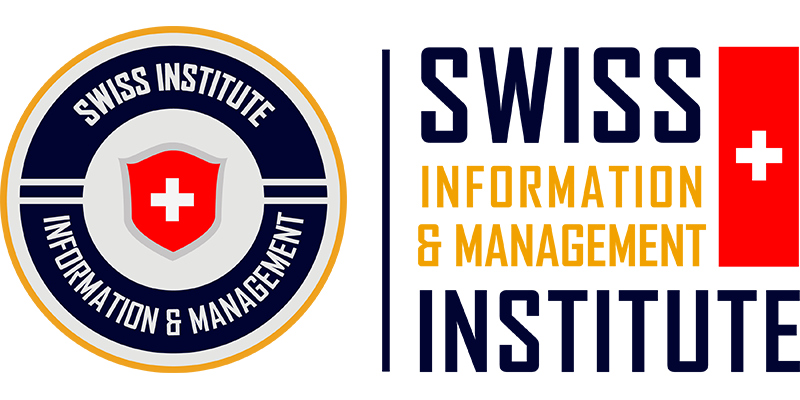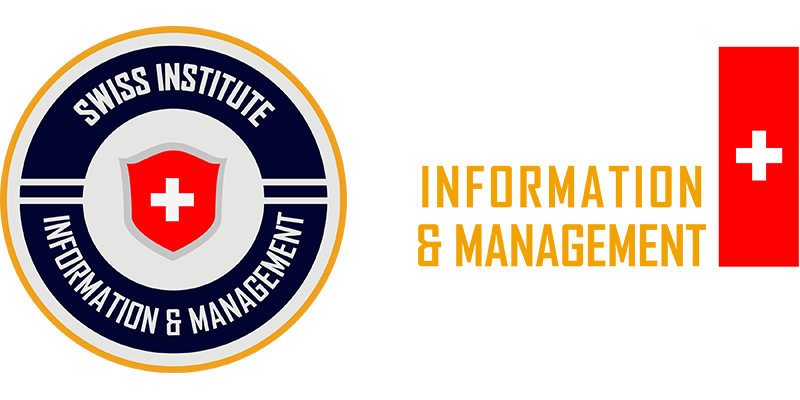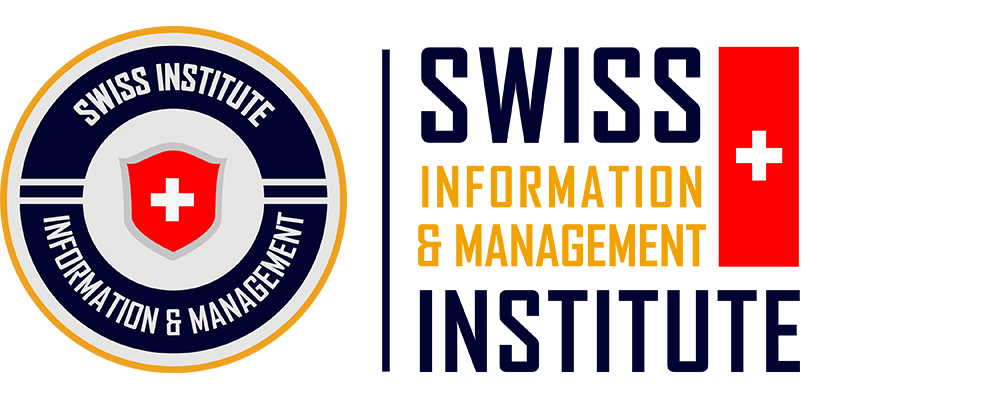The only Swiss Bachelor of Health and Social Care with fully recognized qualifications for each year
The Swiss Bachelor of Health and Social Care program stands out as a leading choice for students pursuing careers in healthcare and social services. This distinctive program offers fully recognized qualifications for each academic year, making it the only program of its kind in Switzerland. Students have the opportunity to earn globally recognized credentials at the end of every year, allowing them to start building their careers while continuing their studies. Designed to provide a comprehensive education in health and social care, this program equips students with the necessary skills and knowledge to excel in a dynamic, growing field, giving them a competitive edge in the job market from the outset of their studies.
Key Benefits of Fully Recognized Yearly Qualifications:
- Early Career Entry
- Financial Flexibility
- Increased Employability
- Career Security
- Global Recognition
- Academic and Professional Balance
- Flexibility in Progression
Along with globally recognized yearly qualifications, the SIMI Swiss program understands what bachelor’s students need:
- Fully Accredited & Recognized
- The Swiss Student Card confirms official Swiss student status and eligibility with SIMI Swiss
- Certified & Micro-Credentials Included
- Multiple Qualifications from SIMI & Prestigious Universities
- Stay updated with the latest trends
- Flexible Learning Model
- Expand your business network
- Academic Support While Studying
- Tuition fee support provided by Swiss EduFund
Qualifications & Professional Recognition within a Bachelor of Health and Social Care Program:
- Year 1: Qualifi Level 4 Diploma in Health and Social Care (Gov Recognition No.601/5058/0)
- Year 2: Qualifi Level 5 Diploma in Health and Social Care (Gov Recognition No.601/5442/1)
- Year 3: OTHM Level 6 Diploma in Business Management (Gov Recognition No. 603/2179/9)
- Final Stage: SIMI Swiss Bachelor of Business Administration (with Hons) in Health and Social Care (Full Accreditation & Recognition HERE)
International Accreditation
SIMI is accredited at both the institutional and programmatic levels by ASIC, HEAD, ISO 21001:2018, OTHM, and Qualifi, which is recognized by Ofqual.
Multi Qualifications
The program is widely recognized by the business community and partners, helping to optimize the use of the diploma after graduation.
21 Pro Recognize credentials
Learners earn 21 professional recognized certifications aligned with the European occupational framework, optimizing their skills upon graduation.
Academic & Research Support
The academic, research and language support system helps students overcome challenges so they can focus solely on excelling in their studies.
Learn and Earn
Year 1 Learn
1. Academic Study Skills (T/505/9498)
Overview
- Develop essential academic skills for effective study in higher education.
- Enhance critical thinking, reflective abilities, and independent learning strategies.
Unit Aims
- Build a foundation for academic success through evidence-based skills.
- Foster reflective practices to maximize personal and professional growth.
Course Details
This course is accredited and mapped to National Occupational Standards. It can also be accumulated towards earning a Level 4 Award from SIMI Swiss if taken independently.
- View details on Learning Outcomes, Topics, and Suggested Readings HERE.
2. Communicating in Health and Social Care (H/505/9495)
Overview
- Explore communication methods used in health and social care settings.
- Understand the importance of confidentiality and effective information sharing.
Unit Aims
- Develop communication strategies to improve service delivery.
- Analyze the benefits and challenges of ICT in health and social care communication.
Course Details
This course is accredited and mapped to National Occupational Standards. It can also be accumulated towards earning a Level 4 Award from SIMI Swiss if taken independently.
- View details on Learning Outcomes, Topics, and Suggested Readings HERE.
3. An Introduction to Healthcare Policy (F/505/9505)
Overview
- Examine the historical and current influences on healthcare policy development.
- Explore contemporary issues impacting policymakers, providers, and service users.
Unit Aims
- Understand key healthcare policy reforms and their impact on service users.
- Evaluate the roles of stakeholders and frameworks in policy development.
Course Details
This course is accredited and mapped to National Occupational Standards. It can also be accumulated towards earning a Level 4 Award from SIMI Swiss if taken independently.
- View details on Learning Outcomes, Topics, and Suggested Readings HERE.
4. Reflective Practice (F/505/9519)
Overview
- Introduce reflective practice as a tool for personal and professional development.
- Link theoretical concepts to practical applications in health and social care.
Unit Aims
- Utilize models of reflection to enhance learning and practice.
- Create personal development plans to support ongoing professional growth.
Course Details
This course is accredited and mapped to National Occupational Standards. It can also be accumulated towards earning a Level 4 Award from SIMI Swiss if taken independently.
- View details on Learning Outcomes, Topics, and Suggested Readings HERE.
5. Managing People in Health and Social Care (L/505/9507)
Overview
- Learn the processes of recruiting, managing, and developing people in care settings.
- Explore strategies to manage organizational change effectively.
Unit Aims
- Evaluate recruitment processes and team development strategies.
- Analyze models and barriers to implementing successful organizational change.
Course Details
This course is accredited and mapped to National Occupational Standards. It can also be accumulated towards earning a Level 4 Award from SIMI Swiss if taken independently.
- View details on Learning Outcomes, Topics, and Suggested Readings HERE.
6. Sociology: Concepts in Health and Ill Health (M/505/9502)
Overview
- Understand sociological concepts related to health and illness in contemporary society.
- Examine how social structures and inequalities influence health outcomes.
Unit Aims
- Evaluate theoretical perspectives and healthcare models.
- Analyze the role of government initiatives in reducing health inequalities.
Course Details
This course is accredited and mapped to National Occupational Standards. It can also be accumulated towards earning a Level 4 Award from SIMI Swiss if taken independently.
- View details on Learning Outcomes, Topics, and Suggested Readings HERE.
Year 1 Earn
1. Get Qualifi Level 4 diploma in Health and Social Care
Upon completing Year 1, students will receive:
- Qualifi Level 4 Diploma in Health and Social Care - Qualification Number: 601/5058/0
Sample Diploma:
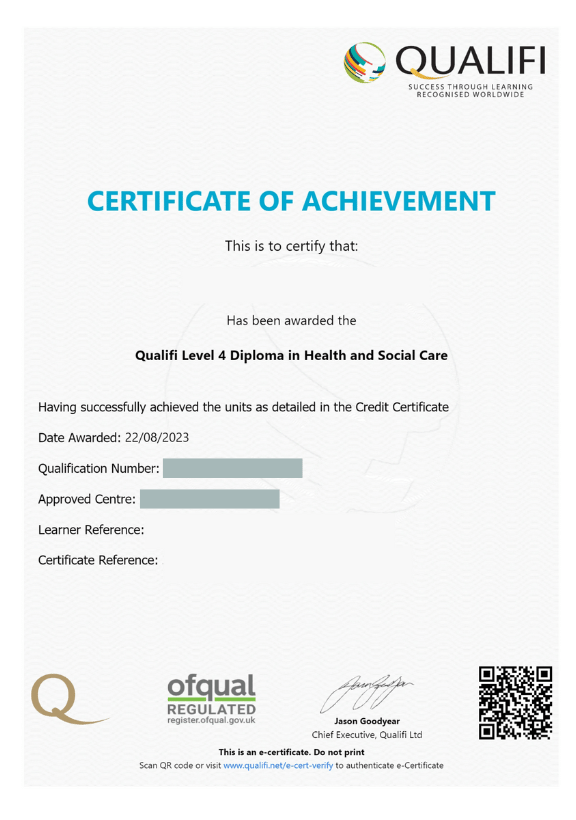
2. Earn 10 Level 4 Pro Recognized e-Certificates
Upon completing the first year, students will receive 6 Level 4 Pro Recognized e-Certificates:
- Level 4 e-Certificate in Academic Study Skills: Develop essential academic, reflective, and critical thinking skills for higher education success.
- Level 4 e-Certificate in Communicating in Health and Social Care: Master effective communication techniques to improve service delivery in care settings.
- Level 4 e-Certificate in An Introduction to Healthcare Policy: Explore the influences on healthcare policy and evaluate contemporary issues affecting it.
- Level 4 e-Certificate in Reflective Practice: Learn reflective techniques to link theory to practice and foster self-development.
- Level 4 e-Certificate in Managing People in Health and Social Care: Understand recruitment, management, and change facilitation in care organizations.
- Level 4 e-Certificate in Sociology: Concepts in Health and Ill Health: Analyze sociological influences on health perceptions and their application in care practices.
Students can convert their e-certificates into hard copy certificates if needed (optional).
3. Gain competencies
Upon completing the first year, students will have acquired the following competencies and, along with the qualification received, will be ready to enter the workforce:
- Apply academic skills to effectively study and reflect in higher education contexts.
- Communicate effectively in health and social care settings, ensuring confidentiality and professionalism.
- Understand healthcare policies and their impact on service delivery and user outcomes.
- Utilize reflective practices to enhance personal and professional development.
- Manage teams and recruit effectively in health and social care environments.
- Analyze sociological concepts to understand health inequalities and their societal implications.
- Apply problem-solving and critical thinking skills to address challenges in care settings.
- Work autonomously and collaboratively in diverse healthcare teams, ensuring effective task execution.
4. Qualified for various positions
Upon completing a Level 4 RQF diploma with these competencies, learners would be qualified for various entry-level and junior management roles across multiple industries. Here are some potential positions:
- Care Assistant: Provide hands-on care and support to individuals in daily activities.
- Healthcare Support Worker: Assist healthcare professionals with basic tasks and patient care.
- Residential Care Worker: Support residents in care homes with their daily living needs.
- Community Care Worker: Deliver care services to individuals in their own homes or community settings.
- Support Worker: Provide emotional and practical assistance to individuals with specific needs.
- Activities Assistant: Help organize activities to promote social engagement and well-being.
- Care Administrative Assistant: Maintain records and assist with administrative tasks in care facilities.
These roles offer opportunities to further develop the skills acquired in the diploma and prepare for more senior positions over time.
Year 2 Learn
1. Principles Underpinning Health and Social Care
Overview:
- Understand the values, theories, and policies underpinning health and social care practices.
- Develop the ability to apply these principles effectively in professional settings.
Unit Aims:
- Examine key principles and how they impact health and social care practice.
- Analyze the role of safeguarding and service user-centered care in enhancing outcomes.
Course Details
This course is accredited and mapped to National Occupational Standards. It can also be accumulated towards earning a Level 5 Award from SIMI Swiss if taken independently.
- View details on Learning Outcomes, Topics, and Suggested Readings HERE.
2. The Management of Quality in Health and Social Care
Overview:
- Learn how to evaluate and ensure quality standards in health and social care services.
- Understand the models and frameworks that contribute to effective service delivery.
Unit Aims:
- Analyze the role of quality assurance and evaluate the impact of quality improvement strategies.
- Investigate the factors influencing the implementation of quality standards.
Course Details
This course is accredited and mapped to National Occupational Standards. It can also be accumulated towards earning a Level 5 Award from SIMI Swiss if taken independently.
- View details on Learning Outcomes, Topics, and Suggested Readings HERE.
3. Research Project
Overview:
- Develop research skills through independent inquiry into a relevant health and social care topic.
- Undertake a pilot research project to apply academic and professional research methodologies.
Unit Aims:
- Formulate a research question and select appropriate methodologies.
- Collect, analyze, and present data to support findings and conclusions.
Course Details
This course is accredited and mapped to National Occupational Standards. It can also be accumulated towards earning a Level 5 Award from SIMI Swiss if taken independently.
- View details on Learning Outcomes, Topics, and Suggested Readings HERE.
4. Partnership Working in Health and Social Care
Overview:
- Explore the importance of collaborative work between service users, professionals, and organizations in health and social care.
- Understand the frameworks and models that guide partnership working.
Unit Aims:
- Critically examine the benefits and challenges of partnership working in service delivery.
- Evaluate the impact of inter-professional collaboration on service outcomes.
Course Details
This course is accredited and mapped to National Occupational Standards. It can also be accumulated towards earning a Level 5 Award from SIMI Swiss if taken independently.
- View details on Learning Outcomes, Topics, and Suggested Readings HERE.
5. Working with Service Users with Complex Needs
Overview:
- Gain an understanding of the complexities associated with providing care for individuals with diverse physical and mental health needs.
- Learn strategies to empower service users to participate in decisions about their care.
Unit Aims:
- Discuss different perceptions of health, disability, and illness.
- Evaluate the role of service design in promoting the independence and rights of service users.
Course Details
This course is accredited and mapped to National Occupational Standards. It can also be accumulated towards earning a Level 5 Award from SIMI Swiss if taken independently.
- View details on Learning Outcomes, Topics, and Suggested Readings HERE.
Year 2 Earn
1. Get Qualifi Level 5 diploma in Health and Social Care
Upon completing Year 2, students will receive:
- Qualifi Level 5 Diploma in Health and Social Care - Qualification Number: 601/5442/1
Qualifi Level 5 Diploma: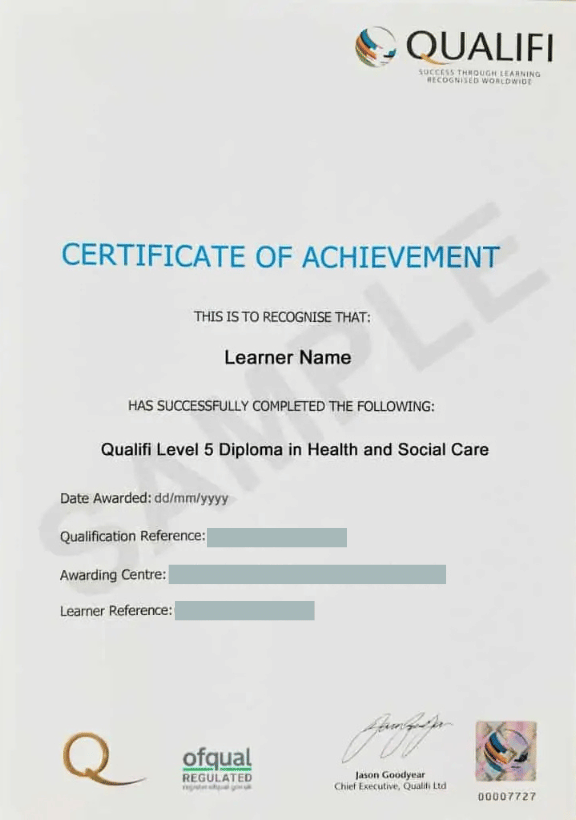
Sample Level 5 Transcript:
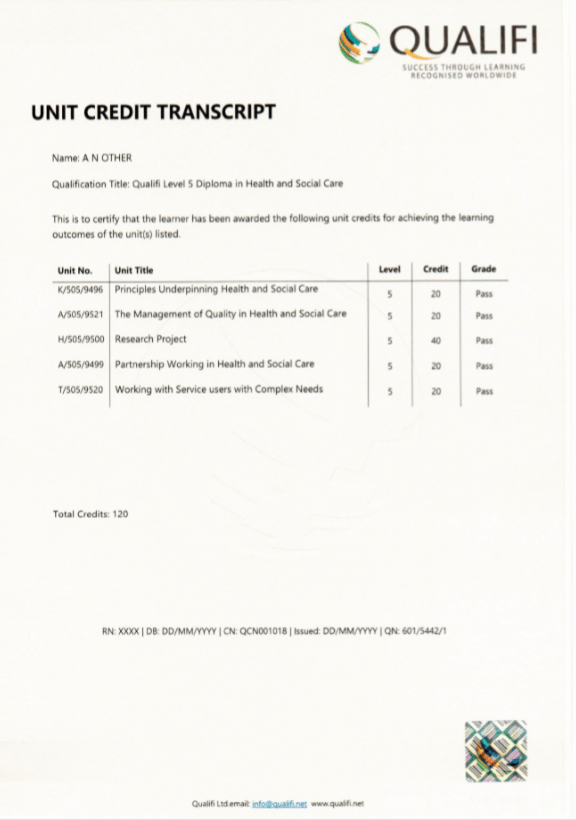
2. Earn 5 Level 5 Pro Recognized e-Certificates
Upon completing the second year, students will receive 5 Level 5 Pro Recognized e-Certificates:
- Level 5 e-Certificate in Principles Underpinning Health and Social Care: Understand values, theories, and policies driving good practice in care settings.
- Level 5 e-Certificate in The Management of Quality in Health and Social Care: Develop skills to evaluate and improve the quality of health and social care services.
- Level 5 e-Certificate in Research Project: Enhance skills in independent enquiry and critical analysis through a focused investigation.
- Level 5 e-Certificate in Partnership Working in Health and Social Care: Learn strategies for effective collaboration with service users, professionals, and organizations.
- Level 5 e-Certificate in Working with Service Users with Complex Needs: Understand and empower individuals with complex physical and mental health needs.
Students can convert their e-certificates into hard copy certificates if needed (optional).
3. Gain competencies
Upon completing the first year, students will have acquired the following competencies and, along with the qualification received, will be ready to enter the workforce:
- Foster effective partnership working with stakeholders to enhance care delivery outcomes.
- Implement safeguarding practices to protect vulnerable individuals in health and social care settings.
- Design and promote health improvement initiatives to address public health challenges.
- Apply leadership and team management skills to optimize performance in care environments.
- Develop and implement policies to ensure the safeguarding and protection of individuals.
- Provide tailored, person-centered care to meet the specific needs of service users.
- Analyze contemporary health and social care issues to adapt to changing demands.
- Demonstrate critical thinking and problem-solving skills to address complex challenges in care management.
4. Qualified for various positions
A Level 5 Diploma in Health and Social Care typically prepares individuals for mid-level management and professional roles within various industries. Here are some qualified positions for someone with a Level 5 Diploma in Health and Social Care:
- Care Team Supervisor: Lead and support care teams to ensure quality service delivery.
- Support Worker: Provide hands-on assistance to individuals in health and social care settings.
- Residential Care Coordinator: Manage daily operations in residential care homes, focusing on resident well-being.
- Activities Coordinator: Organize and deliver engaging activities to enhance the quality of life for service users.
- Health and Social Care Assistant: Support healthcare professionals in delivering essential services to individuals.
- Rehabilitation Assistant: Assist individuals with physical or mental health needs in their recovery journeys.
- Community Outreach Worker: Connect individuals to social services and support networks within the community.
- Administrative Support in Care Settings: Maintain accurate records and support operational tasks in health and social care environments.
These roles involve a higher level of responsibility and decision-making, often requiring a combination of practical experience and theoretical knowledge gained through the Level 5 qualification.
Year 3 Learn
1. Leadership and People Management (H/616/2734)
Overview
- Divided into three parts: leadership theories, people management techniques, and their application.
- Focuses on leadership styles, team dynamics, motivation, conflict resolution, and employee engagement.
- Applies these concepts to real-world management challenges..
Unit Aims
- Develop leadership capabilities.
- Enhance understanding of people management practices to improve team performance and organizational effectiveness.
Course Details
This course is accredited and mapped to National Occupational Standards. It can also be accumulated towards earning a Bachelor Award from SIMI Swiss if taken independently.
- View details on Learning Outcomes, Topics, and Suggested Readings HERE.
2. Business Research (K/616/2735 )
Overview
- Divided into three parts: understanding research methodology, applying research tools, and conducting a business research project.
- Covers qualitative and quantitative research methods, data collection tools, and business research project execution.
Unit Aims
- Develop research skills.
- Conduct rigorous business research that contributes to strategic decision-making and organizational development.
Course Details
This course is accredited and mapped to National Occupational Standards. It can also be accumulated towards earning a Bachelor Award from SIMI Swiss if taken independently.
- View details on Learning Outcomes, Topics, and Suggested Readings HERE.
3. Operations Management (M/616/2736)
Overview
- Divided into three parts: key operations management concepts, resource management, and applying operations tools.
- Focuses on supply chain management, process optimization, quality control, and performance measurement.
Unit Aims
- Enhance understanding of operations management principles.
- Develop skills for optimizing processes, improving efficiency, and ensuring operational excellence.
Course Details
This course is accredited and mapped to National Occupational Standards. It can also be accumulated towards earning a Bachelor Award from SIMI Swiss if taken independently.
- View details on Learning Outcomes, Topics, and Suggested Readings HERE.
4. Financial Decision Making (T/616/2737)
Overview
- Divided into three parts: core financial concepts, financial analysis tools, and real-world business applications.
- Covers financial statements, budgeting, cost analysis, and investment appraisal.
Unit Aims
- Equip learners with skills for making strategic financial decisions.
- Optimize financial performance to support business growth and sustainability.
Course Details
This course is accredited and mapped to National Occupational Standards. It can also be accumulated towards earning a Bachelor Award from SIMI Swiss if taken independently.
- View details on Learning Outcomes, Topics, and Suggested Readings HERE.
5. Sustainable Business Practices (A/616/2738)
Overview
- Divided into three parts: core financial concepts, financial analysis tools, and real-world business applications.
- Covers financial statements, budgeting, cost analysis, and investment appraisal.
Unit Aims
- Enhance understanding of sustainability in business.
- Equip learners to design and implement sustainable practices that align with organizational goals.
Course Details
This course is accredited and mapped to National Occupational Standards. It can also be accumulated towards earning a Bachelor Award from SIMI Swiss if taken independently.
- View details on Learning Outcomes, Topics, and Suggested Readings HERE.
6. Strategic Human Resource Management (F/616/2739)
Overview
- Divided into three parts: strategic HRM, HR practices, and real-world applications.
- Covers talent management, workforce planning, recruitment, training, and performance management.
Unit Aims
- Develop an understanding of the strategic role of HRM in business success.
- Equip learners with the skills to align HR strategies with organizational goals and foster a positive work culture.
Course Details
This course is accredited and mapped to National Occupational Standards. It can also be accumulated towards earning a Bachelor Award from SIMI Swiss if taken independently.
- View details on Learning Outcomes, Topics, and Suggested Readings HERE.
Year 3 Earn
1. Get OTHM Level 6 diploma in Business Management
Upon completing Year 3, students will receive:
- OTHM Level 6 Diploma in Business Management - Qualification Number: 603/2179/9
Sample Level 6 Diploma:
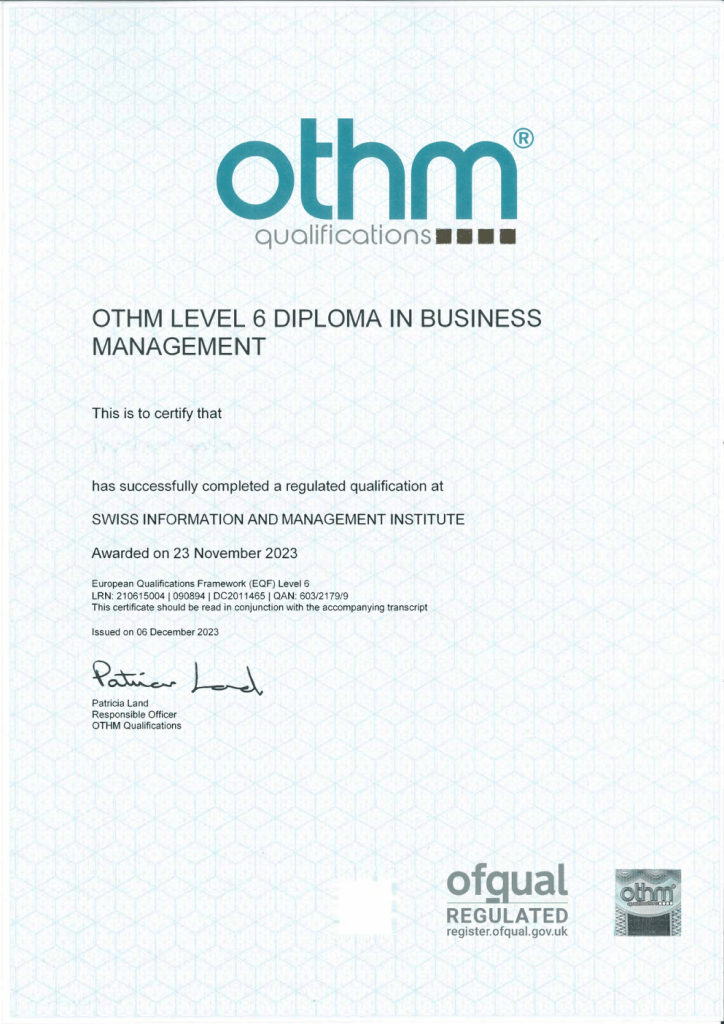
Page 1 of sample diploma
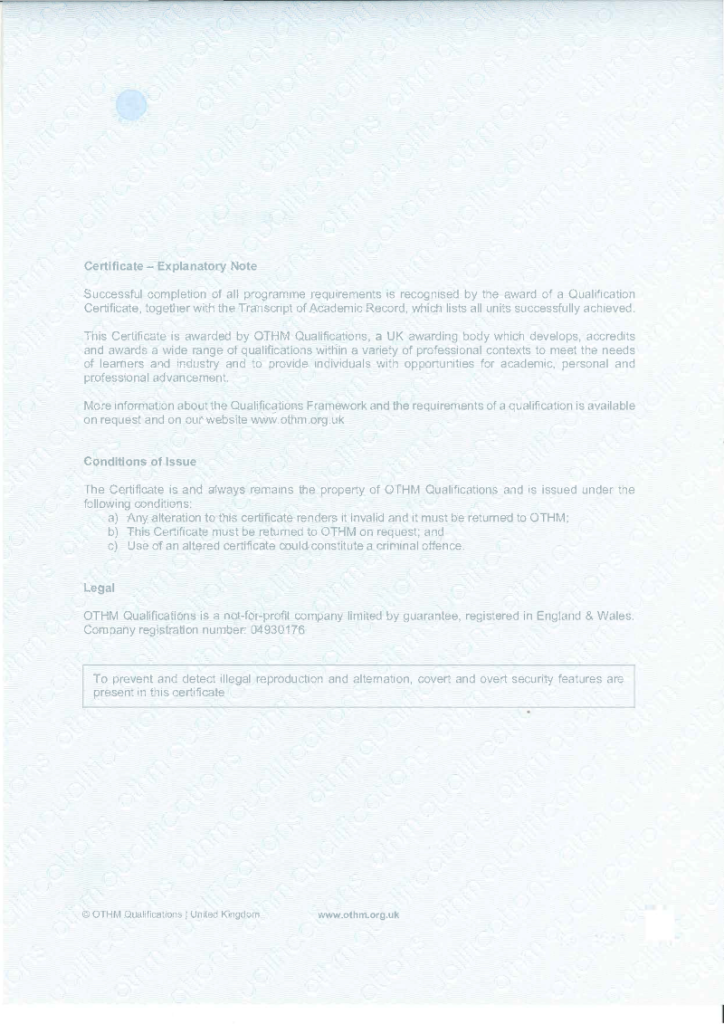
Page 2 of sample diploma
Sample Level 6 Transcript:
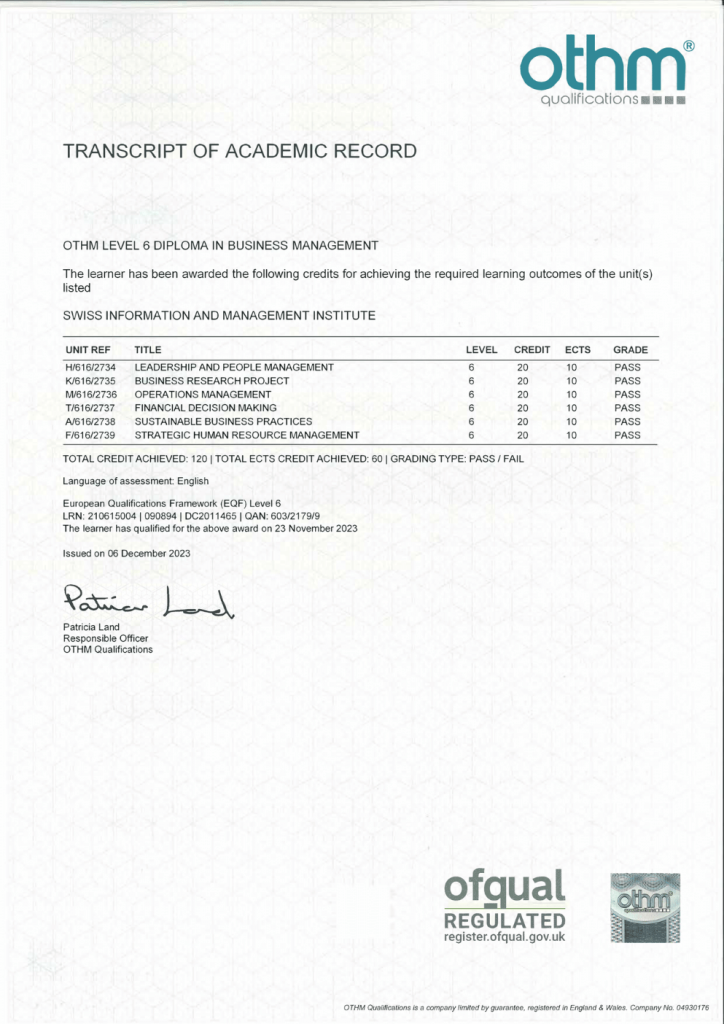
Page 1 of sample transcript
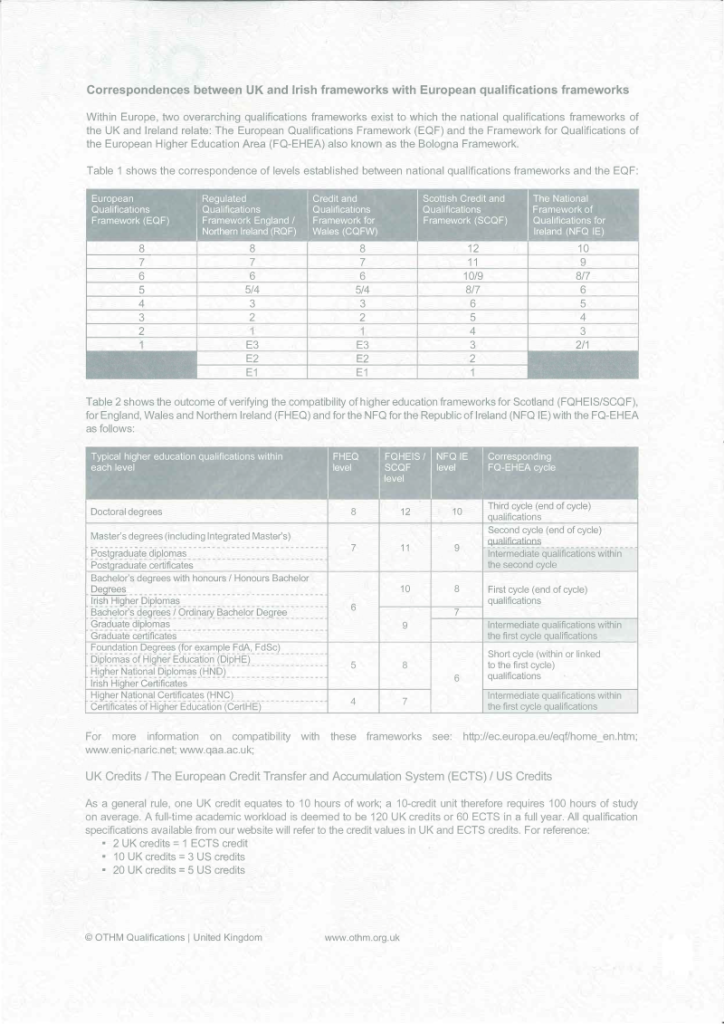
Page 2 of sample transcript
2. Earn 10 Level 6 Pro Recognized e-Certificates
Upon completing the first year, students will receive 10 Level 6 Pro Recognized e-Certificates:
- Level 6 in IT in Business: Evaluate the strategic role of IT in achieving competitive advantage.
- Level 6 in Effective Communication: Master communication strategies to enhance decision-making and collaboration.
- Level 6 in High-Performance Teams: Develop advanced team-building skills for cohesive and productive teams.
- Level 6 in Leadership Skills: Build adaptive leadership capabilities to navigate organizational challenges.
- Level 6 in Manager’s Toolkit: Learn versatile tools for analysis, problem-solving, and strategic planning.
- Level 6 in Managing and Using Finance: Understand finance’s role in guiding strategic decisions.
- Level 6 in Managing and Using Marketing: Create customer-centric strategies to deliver value and satisfaction.
- Level 6 in Managing Organizations: Explore how structure, culture, and management influence performance.
- Level 6 in Personal Effectiveness: Enhance productivity and self-leadership for impactful results.
- Level 6 in Quality and Excellence: Explore the meaning of quality and excellence in products, services, and organizational practices.
Students can convert their e-certificates into hard copy certificates if needed (optional).
3. Gain competencies
Upon completing the first year, students will have acquired the following competencies and, along with the qualification received, will be ready to enter the workforce:
- Strategic Management: Develop and implement strategies to achieve organizational objectives.
- Leadership Skills: Lead teams effectively in dynamic and competitive environments.
- Financial Decision-Making: Analyze financial data to inform strategic business decisions.
- Effective Communication: Master advanced communication techniques for stakeholder engagement.
- Marketing Strategies: Design and execute impactful marketing plans to drive business growth.
- Operational Management: Optimize processes and resources for efficient business operations.
- Problem-Solving and Decision-Making: Apply critical thinking to solve complex business challenges.
- Legal and Ethical Understanding: Navigate legal frameworks and ethical considerations in business.
- Research and Analysis: Conduct in-depth research to support evidence-based decisions.
- Organizational Development: Foster innovation, culture, and performance improvements.
4. Qualified for various positions
Upon completing a Level 6 RQF diploma with these competencies, learners would be qualified for various entry-level and junior management roles across multiple industries. Here are some potential positions:
- Business Manager: Oversee operations, strategy, and organizational goals.
- Operations Manager: Streamline processes and manage day-to-day business activities.
- Marketing Manager: Design and implement marketing strategies to enhance brand performance.
- Finance Manager: Analyze and oversee financial planning, budgeting, and decision-making.
- HR Manager: Develop and manage talent acquisition, employee relations, and HR strategies.
- Project Manager: Lead projects, ensuring they meet objectives, budgets, and deadlines.
- Strategic Planner: Develop long-term plans to achieve organizational goals.
- Team Leader: Motivate and manage teams to meet performance targets.
- Consultant: Provide expert advice in areas such as operations, marketing, or finance.
These roles offer opportunities to further develop the skills acquired in the diploma and prepare for more senior positions over time.
Bachelor Final Stage Learn
Capstone Project
Overview
A Capstone Project is a comprehensive, final assignment that BBA students complete at the end of their program. It is designed to encapsulate the knowledge and skills they have acquired throughout their studies. Unlike traditional exams, a Capstone Project requires students to apply what they've learned to a real-world problem or challenge in their field.
Unit Aims
The capstone aims to provide students:
- Practical Application: The project typically involves solving a practical business problem, conducting research, or developing a strategic plan for a real or simulated organization.
- Integration of Knowledge: Students must integrate and apply concepts from multiple courses, demonstrating their ability to synthesize information and use it effectively in a professional context.
- Research Component: Often, a Capstone Project includes a significant research element, requiring students to gather, analyze, and interpret data to support their conclusions and recommendations.
- Collaboration: Some Capstone Projects are completed in teams, simulating the collaborative nature of real business environments. Others may be individual projects, allowing for a deep dive into a specific area of interest.
- Presentation and Defense: Upon completion, students typically present their project to a panel of faculty members or industry professionals, and defend their methodology, findings, and recommendations.
Benefits of a Capston Project:
- Real-World Experience: Students gain hands-on experience by working on actual business problems or scenarios.
- Skill Development: The project hones critical thinking, problem-solving, research, and communication skills.
- Portfolio Piece: The completed project can serve as a showcase of the student's capabilities, useful for job interviews or career advancement.
- Networking: Projects often involve collaboration with industry professionals, providing valuable networking opportunities.
In essence, a Capstone Project is the culmination of an BBA program, allowing students to demonstrate their expertise and readiness for professional challenges.
Bachelor Final Stage Earn
1. Get Bachelor of Business Administration (with Hons) in Health and Social Care
The Capstone Project, as the culmination of their learning, will showcase learners' ability to apply theoretical knowledge to practical, real-world challenges. This not only enhances their academic credentials but also provides employers with a clear indication of their expertise in financial management.
The selected major will be integrated into their academic progression and will be clearly reflected in their Bachelor of Business Administration with Honours in Health and Social Care qualification, as well as the official transcripts issued by SIMI Swiss.
Sample of Bachelor of Business Administration with Honours in Health and Social Care:
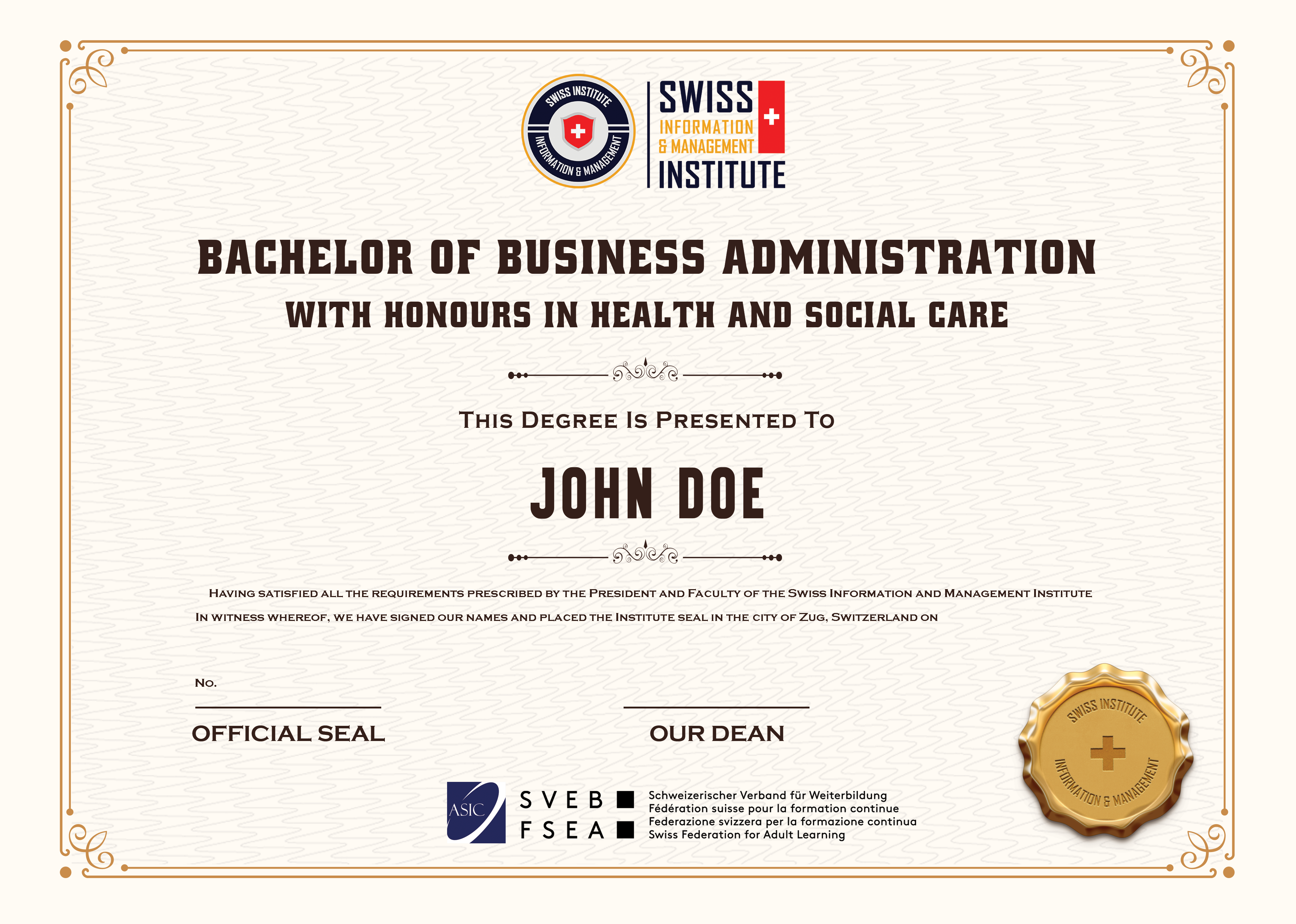
2. Gain competencies
Upon completing the first year, students will have acquired the following competencies and, along with the qualification received, will be ready to enter the workforce:
- Manage health and social care operations to ensure efficiency and quality service delivery.
- Develop effective person-centered care strategies to enhance individual well-being.
- Apply ethical principles and safeguarding practices to protect vulnerable individuals.
- Utilize financial and resource management techniques to optimize care outcomes.
- Analyze global health and social care trends to adapt policies and practices effectively.
- Lead and collaborate with multidisciplinary teams to achieve care objectives.
- Solve complex health and social care challenges using critical thinking and evidence-based practices.
- Communicate effectively, both verbally and in writing, in professional health and social care settings.
3. Qualified for various positions
A Bachelor of Business Administration typically prepares individuals for mid-level management and professional roles within various industries. Here are some qualified positions for someone with a BBA:
- Financial Manager: Responsible for overseeing financial operations, managing budgets, and ensuring the company's financial health.
- Operations Manager: Manages daily operations, optimizes processes, and ensures efficient resource use to meet business objectives.
- Marketing Manager: Develops and executes marketing strategies to promote products/services and drive business growth.
- Human Resources Manager: Handles recruitment, employee relations, and performance management to align human capital with organizational goals.
- Strategic Planner: Works on formulating long-term strategies, analyzing market trends, and aligning business goals for sustainable success.
- Business Consultant: Advises organizations on improving processes, performance, and strategy to achieve business objectives.
These roles involve a higher level of responsibility and decision-making, often requiring a combination of practical experience and theoretical knowledge gained through the Level 5 qualification.
Entry requirements & Learning methods
1. Entry Requirements
In addition to the entry requirements, candidates applying to the program are also assessed for their suitability by the admissions committee before joining the program to ensure that they can acquire and benefit from the program.
Entry requirements:
To enroll this program, learners must possess the criteria below:
- Attained a Level 3 Diploma under the NQF/QCF/RQF system or its equivalent.
English requirements:
If a learner is not from a predominantly English-speaking country, proof of English language proficiency must be provided.
- Common European Framework of Reference (CEFR) level B2 or equivalent;
- Or A minimum TOEFL score of 101 or IELTS 5.5; Reading and Writing must be at 5.5 or equivalent.
Please note:
- SIMI Swiss does not accept entry qualifications from counterfeit universities, Diploma Mills, or universities accredited by unreliable accreditation agencies.
- SIMI Swiss reserves the right to make admissions decisions based on the requirements of recognized agencies and the global quotas of the program.
2. Learning methods
1. Off-Campus Mode
The program is a combination between Live Classes with local tutors (where applicable) for a hybrid learning experience.
- Offering interactive, real-time engagement with instructors.
- Local tutors provide additional guidance to help learners apply theoretical concepts to practical scenarios.
- Ideal for busy professionals seeking flexibility with personalized support.
Learn more about overview of enrolling in online classes at SIMI Swiss [Video HERE]
Learn more about the Effective of SIMI Pedagogy [Video HERE]
2. Fully Online Model
The program is implemented using a combined automated training model that includes:
- Optimized Online Learning System: Designed to enhance the self-study process.
- Bite-Sized Lectures: Lessons are structured in short, manageable modules, enabling students to grasp the content immediately after completing each module.
- Comprehensive Support System: Provides students with the necessary tools and support to efficiently fulfill course requirements.
Learn more about how to use the automated training model at SIMI Swiss [Video HERE]
3. Academic Support
We understand that pursuing an accredited postgraduate program can be both exciting and challenging, especially for busy adult learners. To help you overcome these challenges, we’ve created the SIMI Swiss Supporting Systems, designed to guide you through any difficulties during your studies.
For a full overview of the support available, be sure to watch our informative videos, offering help at every stage of your academic journey.
Supplemental resources and Undergraduate Pro Certified
1. Supply 21 courses mapped to National Occupational Standards
The National Occupational Standard is a crucial benchmark that ensures educational programs meet workplace demands. The Bachelor of Health and Social Care program is fully aligned with the Senior Leader position according to the national competency framework.
Beyond the comprehensive Bachelor of Health and Social Care curriculum, students gain access to an additional 21 professional modules covering a wide range of specializations. This expanded knowledge base enables students to build on their classroom learning and directly apply it to their specific job roles and needs, offering valuable tools for professional growth.
Unlike other study materials, this interactive and exclusive set of resources, developed by SIMI Swiss, is specifically designed for self-study. The knowledge system, aligned with the National Occupational Standard, is divided into 21 knowledge groups, each further broken down into bite-sized lessons. This approach allows students to absorb content quickly and effectively, even when away from their computer or phone.
- Learn more about the National Occupational Standard system [HERE].
- Learn more about the exclusive pedagogy for the supplemental interactive study materials [HERE].
- Learn more about the Master Professional Certified [HERE]
The 21 interactive courses that enhance knowledge and automatically accumulate 21 separate Undergraduate Pro Certifications include:
- Level 4 Pro-Certificate in Academic study skills
- Level 4 Pro-Certificate in Communicating in health and social care
- Level 4 Pro-Certificate in An introduction to healthcare policy
- Level 4 Pro-Certificate in Reflective practice
- Level 4 Pro-Certificate in Managing people in health and social care
- Level 4 Pro-Certificate in Sociology: concepts in health and ill health
- Level 5 Pro-Certificate in Principles underpinning health and social care
- Level 5 Pro-Certificate in The management of quality in health and social care
- Level 5 Pro-Certificate in Research project
- Level 5 Pro-Certificate in Partnership working in health and social care
- Level 5 Pro-Certificate in Working with service users with complex needs
- Level 6 Pro-Certificate in IT in Business
- Level 6 Pro-Certificate in Effective Communications
- Level 6 Pro-Certificate in High Performance Teams
- Level 6 Pro-Certificate in Leadership Skills
- Level 6 Pro-Certificate in Manager’s Toolkit
- Level 6 Pro-Certificate in Managing and Using Finance
- Level 6 Pro-Certificate in Managing and Using Marketing
- Level 6 Pro-Certificate in Managing Organisations
- Level 6 Pro-Certificate in Personal Effectiveness
- Level 6 Pro-Certificate in Quality and Excellence
2. Supply 21 webinars mapped to National Occupational Standards
In addition to comprehensive lessons with built-in interactive activities and an exclusive self-study pedagogy, each knowledge module aligned with the National Occupational Standard includes instructional videos (webinars). BBA (Hons) in Majors students at SIMI Swiss are provided with 21 video webinars corresponding to the 21 interactive modules, ensuring a well-rounded and complete learning experience.
The 21 video webinars include:
- Webinar - Academic Study Skills:
Explore essential academic skills, including critical thinking, reflection, and independent learning. - Webinar - Communicating in Health and Social Care:
Learn effective communication techniques to enhance service delivery in care settings. - Webinar - An Introduction to Healthcare Policy:
Understand how healthcare policies are influenced and their impact on service users. - Webinar - Reflective Practice:
Develop skills in reflective practice to link theory with real-world care delivery. - Webinar - Managing People in Health and Social Care:
Discover strategies for recruiting, managing, and developing teams in care environments. - Webinar - Sociology: Concepts in Health and Ill Health:
Examine sociological influences on health perceptions and their impact on care practices. - Webinar - Principles Underpinning Health and Social Care:
Explore the values, theories, and policies driving good practice in care settings. - Webinar - The Management of Quality in Health and Social Care:
Learn how to evaluate and improve service quality in health and social care environments. - Webinar - Research Project:
Gain insights into conducting independent research to address health and social care challenges. - Webinar - Partnership Working in Health and Social Care:
Understand how to build effective collaborations with service users, professionals, and organizations. - Webinar - Working with Service Users with Complex Needs:
Learn strategies to empower individuals with complex health and social care needs. - Webinar - IT in Business: Explores the role of information technology in enhancing business efficiency and decision-making.
- Webinar - Effective Communications: Focuses on improving communication in business, emphasizing clarity and influence.
- Webinar - High Performance Teams: Discusses strategies for building and leading high-performing teams in organizations.
- Webinar - Leadership Skills: Focuses on developing essential leadership skills for managing teams and organizations.
- Webinar - Manager’s Toolkit: Introduces key management tools and techniques for effective decision-making and problem-solving.
- Webinar - Managing and Using Finance: Teaches how to effectively manage financial resources for business success.
- Webinar - Managing and Using Marketing: Focuses on applying marketing strategies to enhance business growth and customer engagement.
- Webinar - Managing Organisations: Examines strategies for managing organizational structure, culture, and operations.
- Webinar - Personal Effectiveness: Focuses on improving personal productivity and effectiveness in a professional setting.
- Webinar - Quality and Excellence: Explores the principles of quality management and achieving excellence in business processes.
3. Earn 21 Undergraduate Pro Certifications via automated testing
While an BBA (with Hons) in Health and Social Care degree certifies academic achievement at the Bachelor's level, in the workplace, Undergraduate Pro Certifications help professionals demonstrate their knowledge, skills, and ability to take responsibility in their specific fields.
As a program mapped to National Occupational Standards, along with the supplemental knowledge system, students can engage in self-study through interactive lessons, attend webinars, and take online tests to earn 21 Undergraduate Pro Certifications. Each ProCert reflects Level 4,5,6 (Undergraduate Level), outlines the Learning Outcomes, and provides certification upon completion.
If students wish to convert their e-Undergraduate Pro Certifications to hard copies, they can use an optional service for a minimal fee.
The 21 Undergraduate ProCerts that learners can obtain during the BBA (with Hons) in Health and Social Care program (note: this is optional):
- Level 4 Pro-Certificate in Academic study skills
- Level 4 Pro-Certificate in Communicating in health and social care
- Level 4 Pro-Certificate in An introduction to healthcare policy
- Level 4 Pro-Certificate in Reflective practice
- Level 4 Pro-Certificate in Managing people in health and social care
- Level 4 Pro-Certificate in Sociology: concepts in health and ill health
- Level 5 Pro-Certificate in Principles underpinning health and social care
- Level 5 Pro-Certificate in The management of quality in health and social care
- Level 5 Pro-Certificate in Research project
- Level 5 Pro-Certificate in Partnership working in health and social care
- Level 5 Pro-Certificate in Working with service users with complex needs
- Level 6 Pro-Certificate in IT in Business
- Level 6 Pro-Certificate in Effective Communications
- Level 6 Pro-Certificate in High Performance Teams
- Level 6 Pro-Certificate in Leadership Skills
- Level 6 Pro-Certificate in Manager’s Toolkit
- Level 6 Pro-Certificate in Managing and Using Finance
- Level 6 Pro-Certificate in Managing and Using Marketing
- Level 6 Pro-Certificate in Managing Organisations
- Level 6 Pro-Certificate in Personal Effectiveness
- Level 6 Pro-Certificate in Quality and Excellence
Check out the way you could get 21 electric Undergraduate Professional Certified [Video HERE]
Program accreditations
1. Accreditation review guidelines by SIMI Swiss
SIMI is the first higher education institute in Zug, Switzerland, to achieve comprehensive international accreditations at both the organizational and program levels. The video below guides you through the step-by-step process of verifying and checking SIMI Swiss's accreditations and recognitions. All MBA Swiss programs, owned by SIMI Swiss, benefit from these quality standards.
2. Refer to SIMI Swiss information in SVEB Switzerland
SVEB Switzerland (Schweizerischer Verband für Weiterbildung) is the Swiss Federation for Adult Learning and serves as the national umbrella organization for adult education in Switzerland. SVEB is recognized as the leading authority in Switzerland for promoting and supporting lifelong learning and professional development through a wide range of educational programs and certifications.
Benefits of the SIMI Programs Published in SVEB:
- Officially on the Swiss federal portal: Being published in SVEB gives the SIMI Swiss program official publication in Switzerland, validating its quality and adherence to Swiss educational standards.
- Increased Credibility: Membership and listing with SVEB enhance the credibility of the SIMI Swiss program, making it more attractive to prospective students and employers who value SVEB-approved programs.
- Professional Advancement: Programs listed with SVEB are often aligned with the needs of the Swiss job market, increasing graduates' employability and supporting their career progression within Switzerland.
- Access to a Wider Network: Association with SVEB connects the SIMI Swiss program to a broader network of educational institutions, professionals, and employers across Switzerland, offering opportunities for collaboration, networking, and knowledge exchange.
- Compliance with Swiss Standards: SVEB ensures that SIMI Swiss programs meet high educational standards, including up-to-date content, qualified instructors, and effective teaching methods, enhancing the overall learning experience for students.
- Support for Lifelong Learning: SVEB’s focus on adult education means the SIMI program aligns with lifelong learning principles, supporting students in their ongoing professional development.
Check the SIMI Swiss programs on SVEB HERE.
3. Accreditation of Level 6 Diploma in Business Management of OTHM
The BBA program at SIMI Swiss offers a dual degree in partnership with OTHM, the Ofqual UK.Gov awarding body:
- Recognized as an organization by the educational authority of the United Kingdom, Ofqual (UK.Gov). Recognition Number: RN5284. Refer to the recognition information CLICK HERE
- OTHM Level 6 Diploma in Business Management is accredited with the Ofqual UK.Gov code 603/2179/9. Refer to the accreditation information CLICK HERE
Reference:
- Guidelines of how to check the recognition of OTHM: CLICK HERE
- Why Level UK offers optimal educational effectiveness for learners?: CLICK HERE
- The meaning of Level System in the labor market in the context of global labor mobility: CLICK HERE
- The meaning of Level System in global diploma recognition: CLICK HERE
You will get
Dual Bachelor
21 Pro Recognized
Swiss Student Card
Academic Support
Update Trend
All Undergraduate Programs
Fully Accredited
Multi Recognition
Bachelor of Business Administration (For Individual with Experience)
Powered by BizSchool of Zug
Bachelor of Business Administration
Powered by BizSchool of Zug
Bachelor of Accounting and Finance
Powered by BizSchool of Zug
Bachelor of IT and Computing
Powered by IT Institute of Switzerland
Bachelor IT and E-commerce
Powered by IT Institute of Switzerland
Bachelor of IT and Networking
Powered by IT Institute of Switzerland
Bachelor of IT and Web Design
Powered by IT Institute of Switzerland
Bachelor of Hospitality & Tourism Management
Powered by Hospitality School
Bachelor of Health & Social Care Management
Powered by Swiss Healthcare School
Bachelor of Logistics and Supply Chain Management
Powered by LSCM Switzerland
Bachelor of Education and Training Management
Powered by Swiss EduSchool
